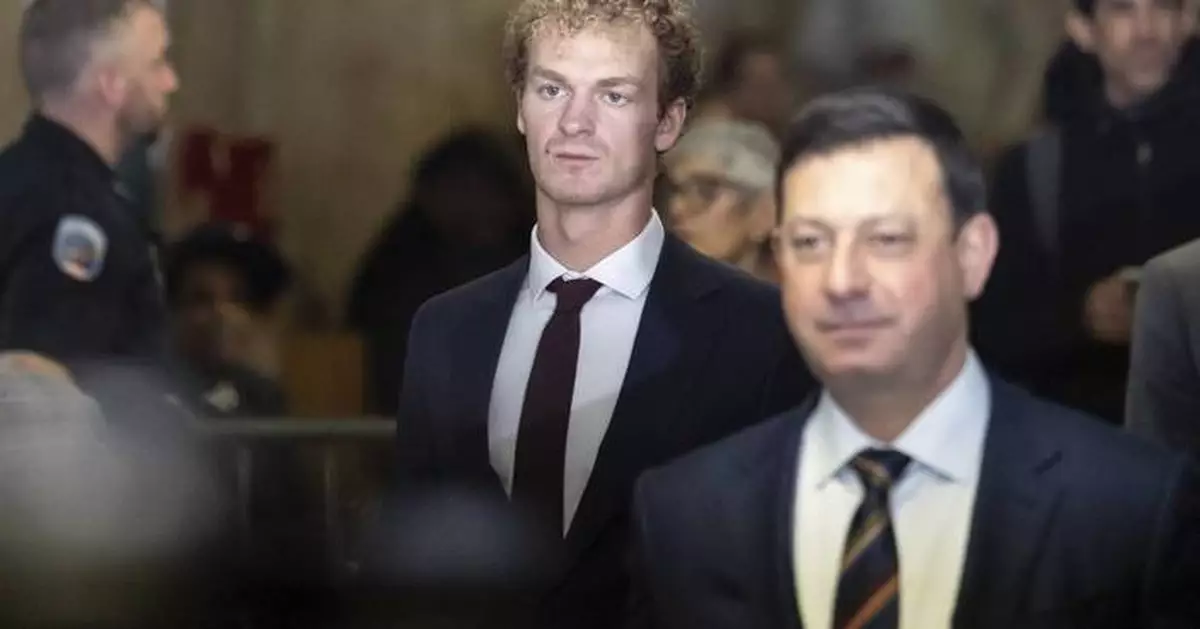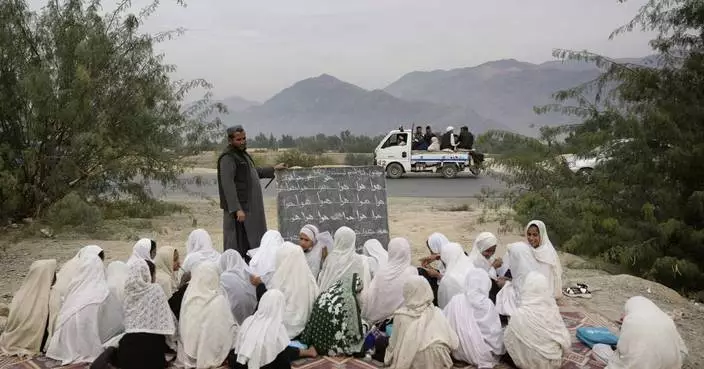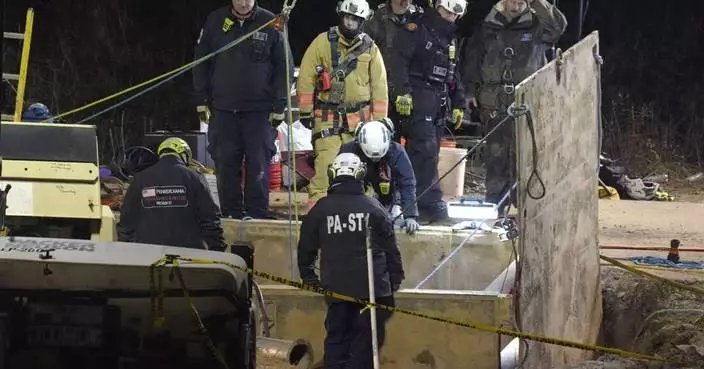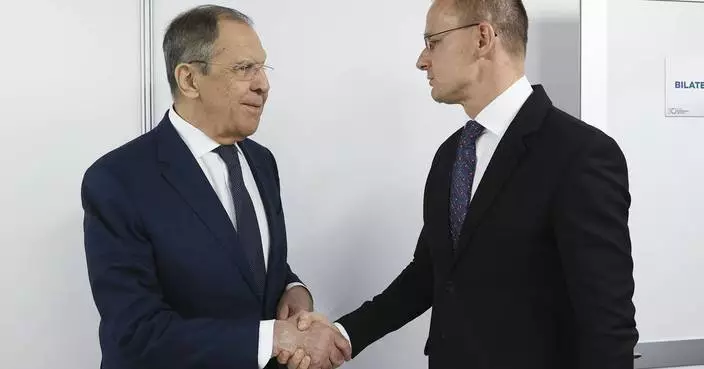NEW YORK (AP) — Jurors began deliberating and soon revisited some of their legal instructions Tuesday in the trial of a military veteran charged with using a fatal chokehold to subdue a New York subway rider whose behavior was alarming other passengers.
The anonymous jury is weighing manslaughter and criminally negligent homicide charges in the death of Jordan Neely, a troubled street performer who was homeless. The veteran, Daniel Penny, has pleaded not guilty and maintains that his actions were justified.
Click to Gallery
Daniel Penny leaves courtroom for a lunch break in New York, Tuesday, Dec. 3, 2024. (AP Photo/Yuki Iwamura)
Daniel Penny leaves courtroom for a lunch break in New York, Tuesday, Dec. 3, 2024. (AP Photo/Yuki Iwamura)
Daniel Penny leaves courtroom for a lunch break in New York, Tuesday, Dec. 3, 2024. (AP Photo/Yuki Iwamura)
Daniel Penny arrives at the courtroom from a break in New York, Tuesday, Dec. 3, 2024. (AP Photo/Yuki Iwamura)
Daniel Penny arrives at the courtroom from a break in New York, Tuesday, Dec. 3, 2024. (AP Photo/Yuki Iwamura)
Daniel Penny arrives at the courtroom from a break in New York, Tuesday, Dec. 3, 2024. (AP Photo/Yuki Iwamura)
In a reflection of the complexities of the closely watched case, the jury asked within the first 75 minutes of deliberations to rehear Judge Maxwell Wiley's instructions on justification defenses and on the definitions of the crimes charged. After the re-reading and 90 more minutes of deliberations, jurors headed home for the day without reaching a verdict.
Penny, 26, has said he was protecting fellow subway riders and intended only to restrain Neely and hold him for police, not to hurt him. Prosecutors say the Marine veteran used far too much force for too long when he gripped Neely by the neck for about six minutes.
The case has animated debate about public safety, societal responses to mental illness and homelessness, the line between self-defense and aggression, and the role of race in all of it.
Forming a tableau of the divisions surrounding the case, a small number of protesters outraged by the death of Neely, who was Black, routinely wait for Penny, who is white, to arrive at court, as does a Penny supporter. Some well-known Democratic politicians paid respects at Neely's funeral, while Penny has gotten support from prominent Republicans.
New York Mayor Eric Adams, a Democrat, cast the case this weekend as an illustration of mental health system failures that ultimately had Neely making threats in a subway car.
“We have to recognize we have a mental health crisis and we're not doing enough to solve it,” the mayor said in a WOR-AM radio interview. He added that he didn't want to prejudge the jury's decision.
The 30-year-old Neely sometimes entertained passersby with Michael Jackson impersonations but also struggled with depression, schizophrenia and drug use after his mother was strangled during his teen years. Penny was a college architecture student who served four years in the Marines.
Witnesses said Neely boarded a train under Manhattan on May 1, 2023, started moving erratically, yelling about his hunger and thirst and proclaiming that he was ready to die, to go to jail or — as Penny and some other passengers recalled — to kill.
Penny came up behind Neely, grabbed his neck and head and took him to the floor. The veteran later told police he'd held Neely in “a choke” and “put him out” to ensure he wouldn't hurt anyone.
City medical examiners ruled that Neely was killed by having his neck compressed in a chokehold. A pathologist hired by Penny’s defense contradicted that finding, attributing the death to a variety of other factors.
Penny's lawyers argued that he used what they term a “civilian restraint,” departing from the chokehold technique he'd been taught in the military, in order to control Neely without rendering him unconscious. Prosecutors say Neely had the training to know that what he was doing could kill.
Wiley told jurors Tuesday that if they convict Penny of manslaughter, they won't be asked for a verdict on the lesser charge of criminally negligent homicide. If they decide he's not guilty of manslaughter, they'll consider the second charge.
Manslaughter requires proving that a defendant recklessly caused another person's death. The standard entails, among other things, consciously disregarding a substantial and unjustifiable risk that an action will be deadly.
Criminally negligent homicide, on the other hand, involves engaging in serious “blameworthy conduct” while not perceiving such a risk.
Both charges are felonies. Neither carries mandatory prison time, but both carry the possibility of it — up to 15 years for manslaughter, or four for criminally negligent homicide.
Deliberations will resume Wednesday.
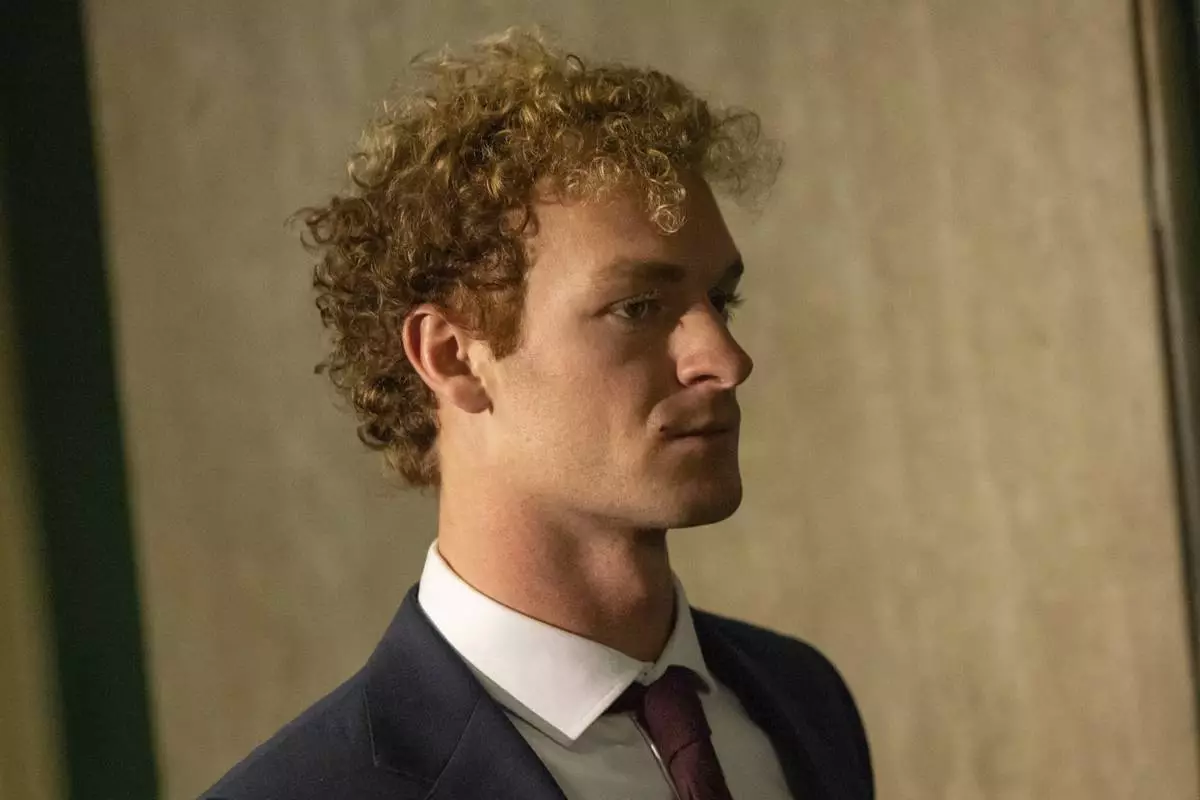
Daniel Penny leaves courtroom for a lunch break in New York, Tuesday, Dec. 3, 2024. (AP Photo/Yuki Iwamura)
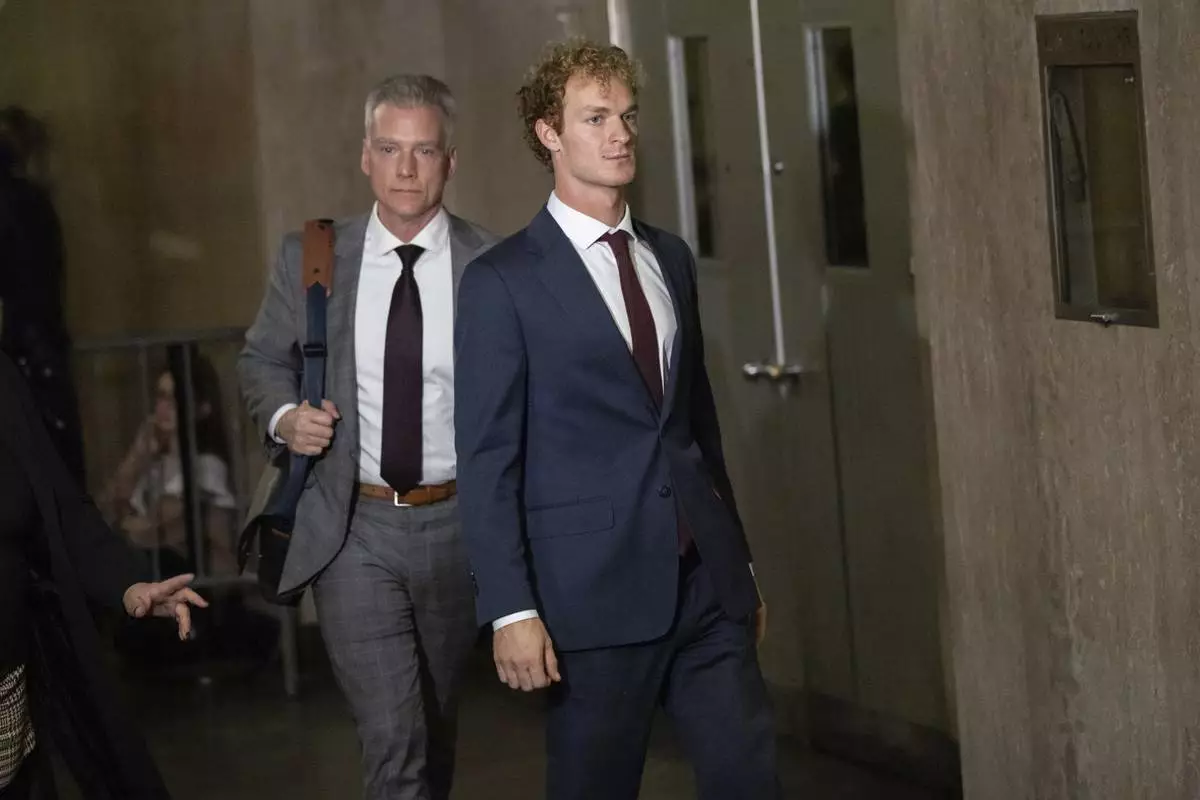
Daniel Penny leaves courtroom for a lunch break in New York, Tuesday, Dec. 3, 2024. (AP Photo/Yuki Iwamura)
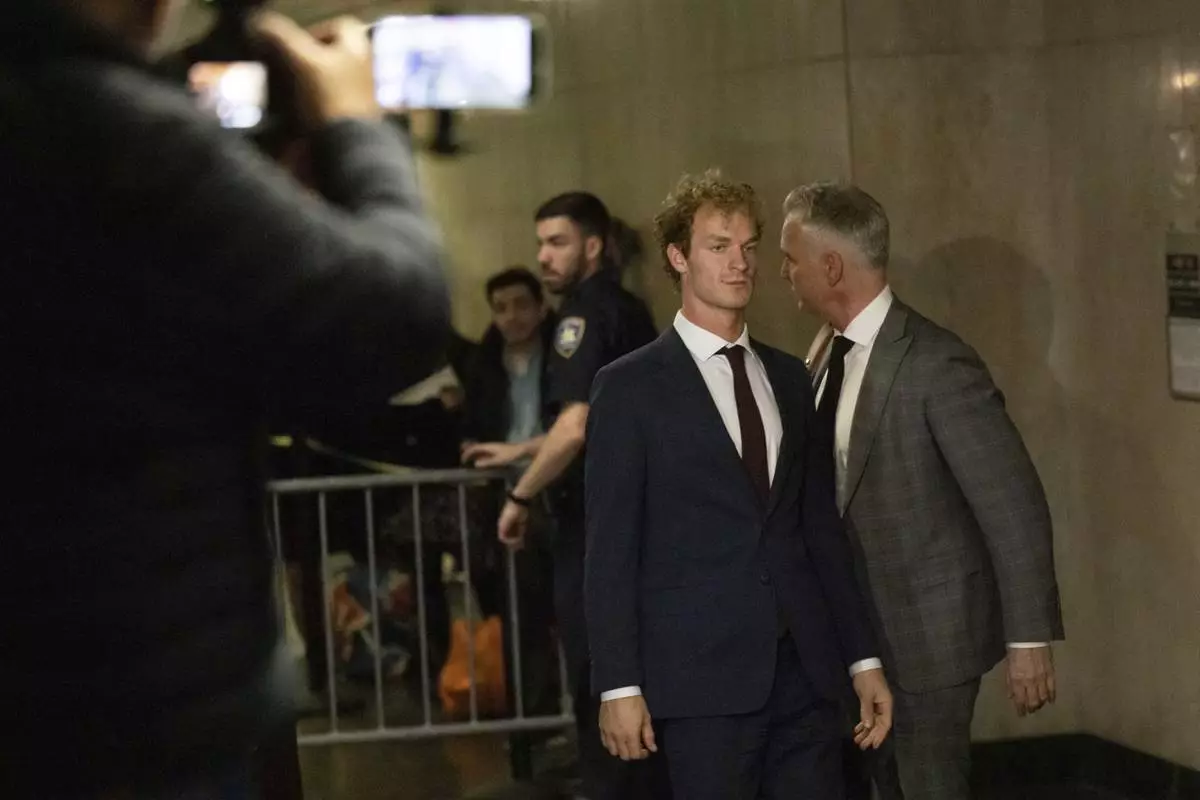
Daniel Penny leaves courtroom for a lunch break in New York, Tuesday, Dec. 3, 2024. (AP Photo/Yuki Iwamura)
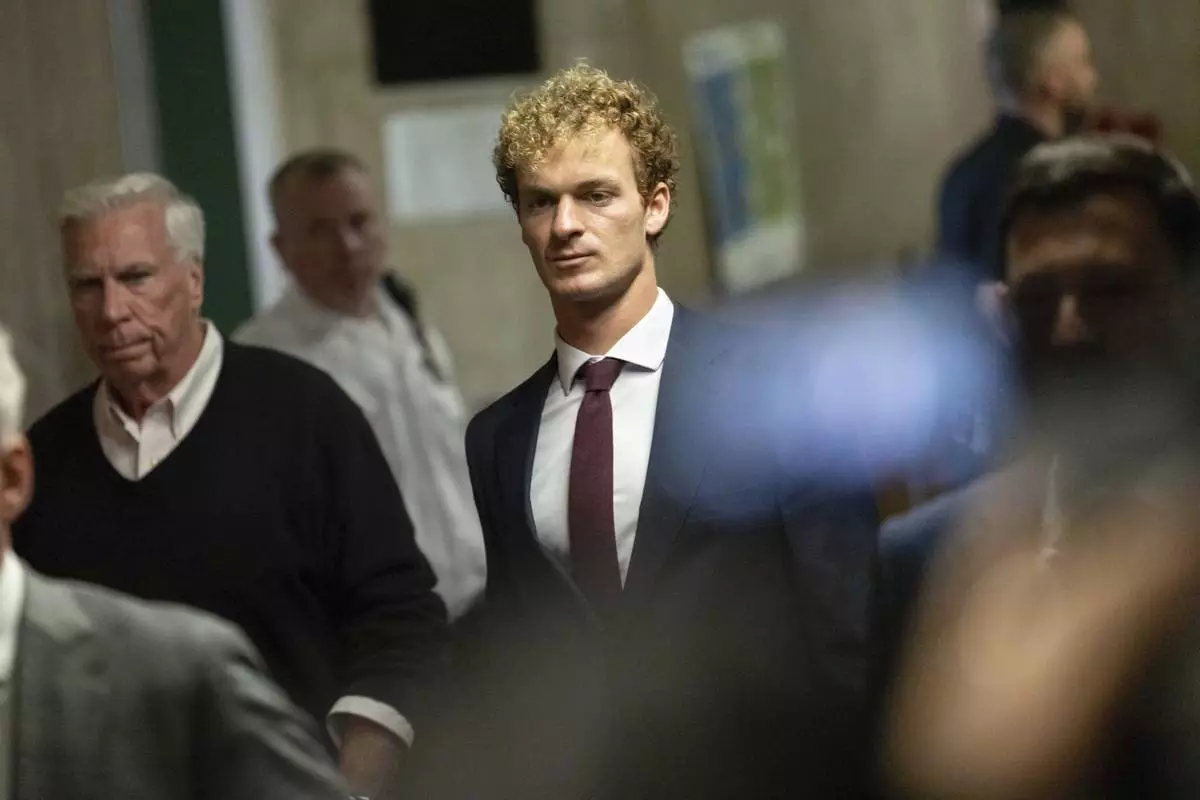
Daniel Penny arrives at the courtroom from a break in New York, Tuesday, Dec. 3, 2024. (AP Photo/Yuki Iwamura)
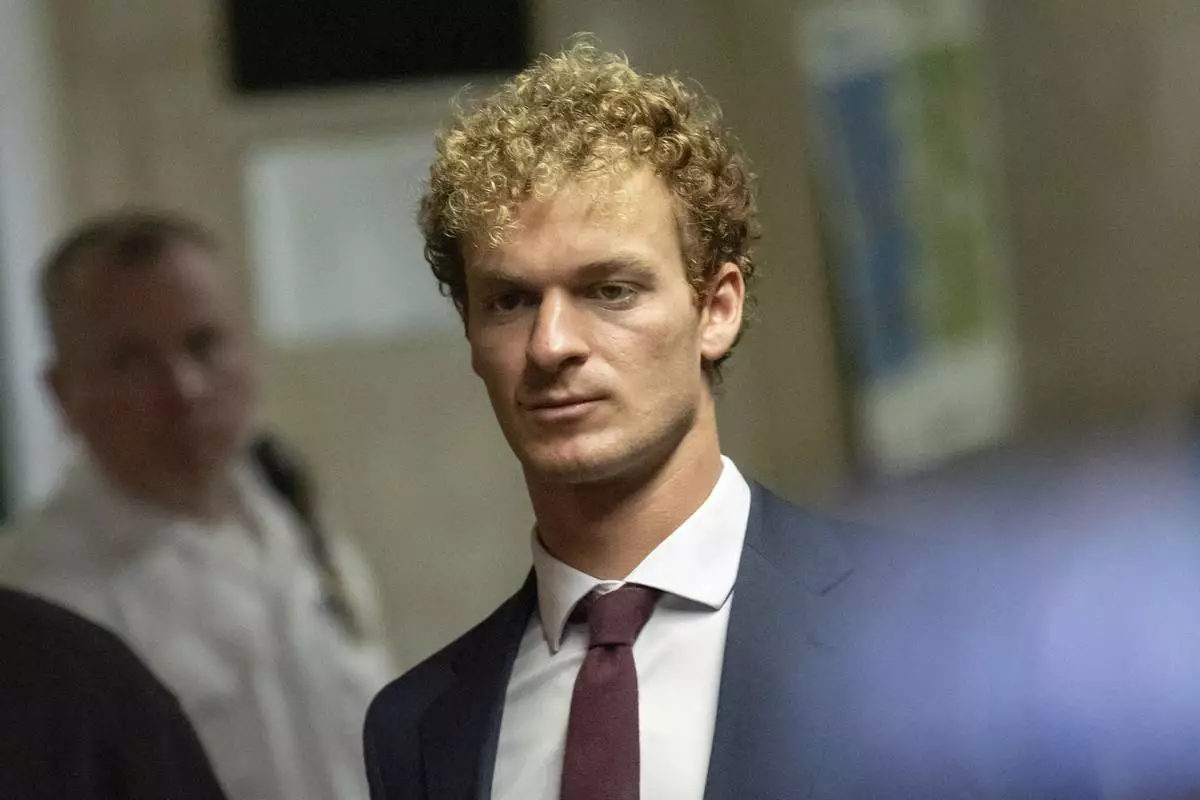
Daniel Penny arrives at the courtroom from a break in New York, Tuesday, Dec. 3, 2024. (AP Photo/Yuki Iwamura)
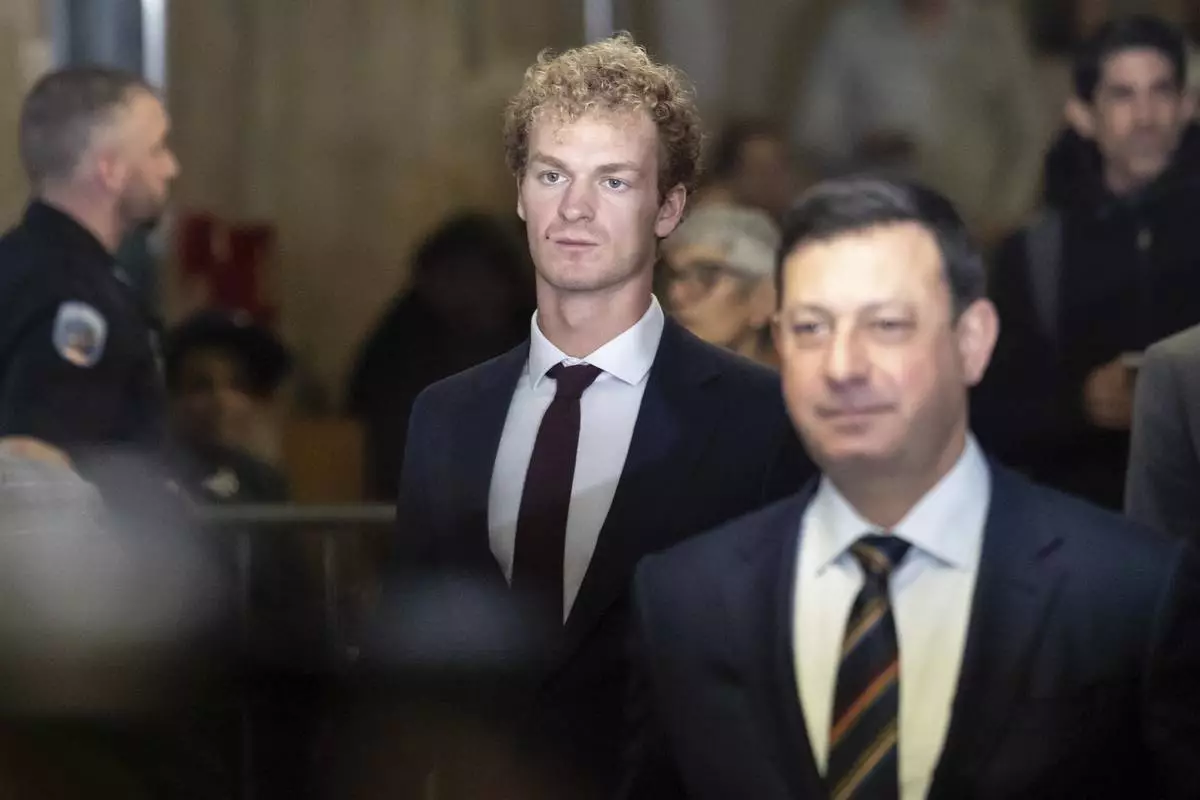
Daniel Penny arrives at the courtroom from a break in New York, Tuesday, Dec. 3, 2024. (AP Photo/Yuki Iwamura)
BEIRUT (AP) — Syria said Wednesday its counteroffensive has pushed back insurgents attempting to advance to the strategic central city of Hama, while the insurgency says it captured more Syrian troops and Iran-backed militants in fierce battles.
The latest flareup in Syria's long civil war comes after forces opposed to Syrian President Bashar Assad over the past days captured large parts of the northern city of Aleppo, the country's largest, as well as towns and villages in southern parts of the northwestern Idlib province.
The offensive is being led by Hayat Tahrir al-Sham, a jihadi group, as well as an umbrella group of Turkish-backed Syrian militias called the Syrian National Army. For years, both have entrenched themselves in northwest Idlib province and parts of northern Aleppo, as the battered country reeled from years of political and military stalemates.
The war between Assad and his foreign backers and the array of armed opposition forces seeking his overthrow has killed an estimated half-million people over the past 13 years.
Syrian state media SANA on Wednesday said insurgents retreated some 20 kilometers (12 miles) from government-held Hama, Syria's fourth largest city, as government troops backed by Russian airpower entrenched themselves in the outskirts. Fierce fighting has raged for days as Damascus fears that the insurgents will make their way into the city like they did over the weekend into Aleppo.
A Syrian photographer working for the German news agency dpa was killed in an airstrike near the city of Hama, the agency said Wednesday. Anas Alkharboutli, 32, has long documented Syria’s civil war, which started after a brutal crackdown on a popular uprising against Assad in 2011. He has worked for dpa since 2017.
The insurgency through its Military Operations Department channel on the Telegram app said they captured five Iran-backed militants, of whom two were from Afghanistan, as well as three Syrian troops from its 25th Special Mission Forces Division in eastern Hama. The claims could not be independently confirmed.
If the insurgents seize Hama city and control the province, it could leave the coastal cities of Tartous and Lattakia isolated from the rest of the country. Lattakia is a key political stronghold for Assad and Syria's Alawite community and a strategic Russian naval base.
Tens of thousands have been displaced by the fighting, which started last week, Geir Pedersen, the U.N. special envoy for Syria, said Tuesday.
“If we do not see deescalation and a rapid move to a serious political process, involving the Syrian parties and the key international players, then I fear we will see a deepening of the crisis," Pedersen said in an address the U.N. Security Council. "Syria will be in grave danger of further division, deterioration, and destruction."
Turkey, which backs Syria's opposition, has called on Assad to reconcile with opposition forces and include them in any political solution to end the conflict.
Ankara has been seeking to normalize ties with Syria to address security threats from groups affiliated with Kurdish militants along its southern border and to help ensure the safe return of more than 3 million Syrian refugees. Assad has insisted that Turkey’s withdrawal of its military forces from northern Syria be a condition for any normalization between the two countries.
Damascus views the insurgents as terrorists, and Assad has vowed to respond to the insurgency with an iron fist.
Turkish and Iranian officials have met earlier this week, in a bid to reach a solution to deescalate the flareup. Arab countries bordering Syria and once backed groups that tried to overthrow Assad, have expressed their concern of the conflict's regional impacts, and have backed the president.
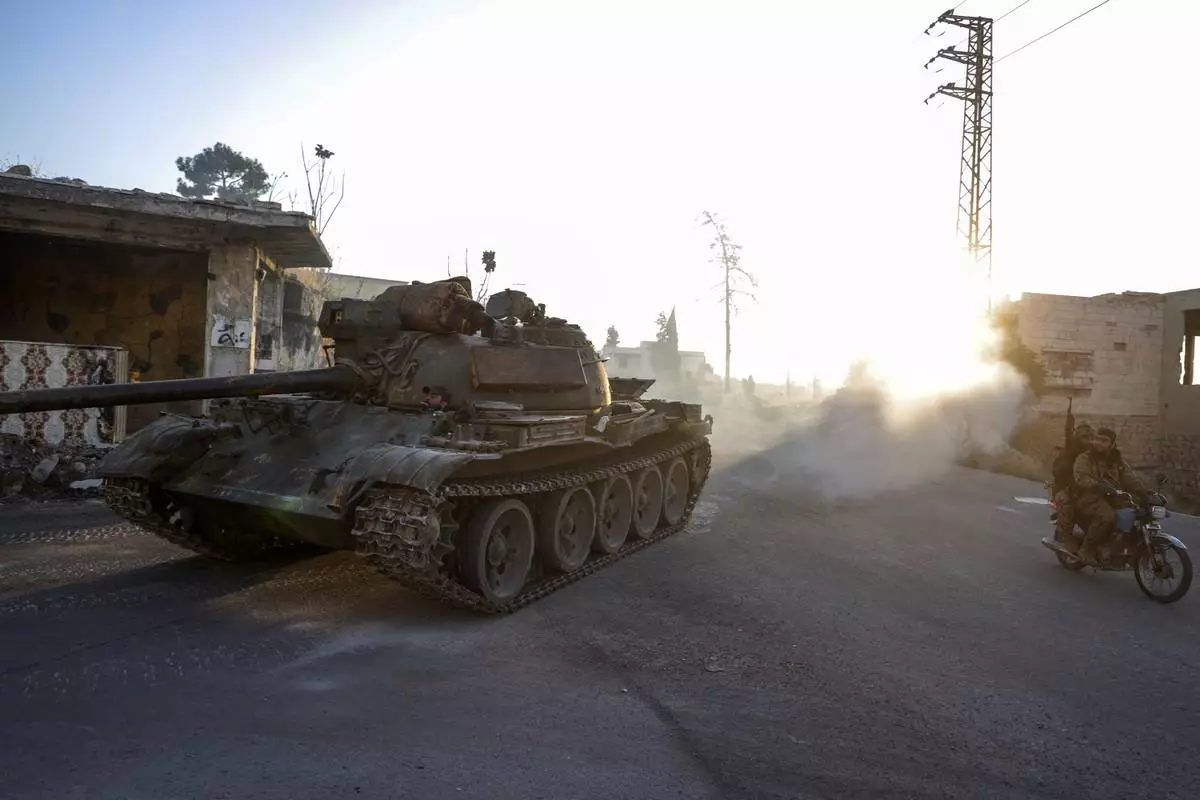
Syrian opposition fighters drive a motorcycle and an armoured vehicle seized from the Syrian army in the town of Maarat al-Numan, south of Idlib, Syria, Tuesday Dec. 3, 2024.(AP Photo/Omar Albam)
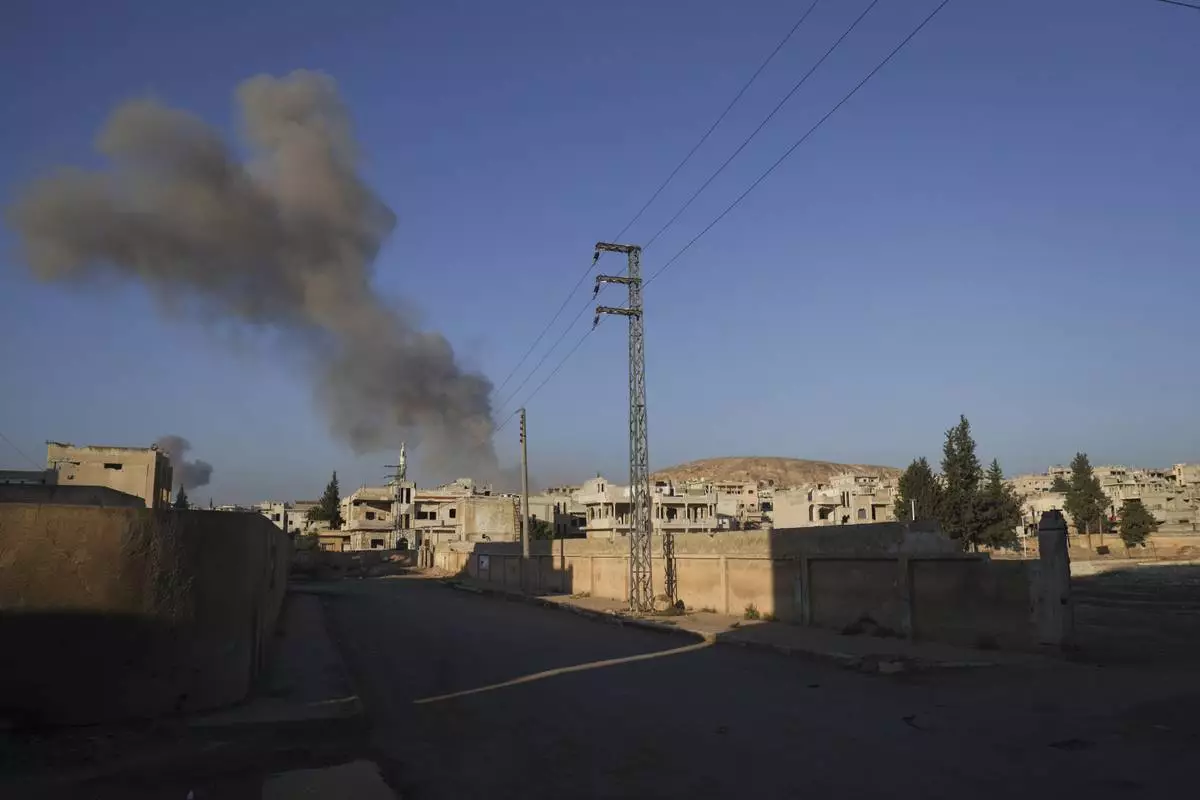
Smoke from an airstrike by government forces billows in the sky over the town of Khan Sheikhoun, south of Idlib, Syria, Tuesday, Dec. 3, 2024. (AP Photo/Omar Albam)
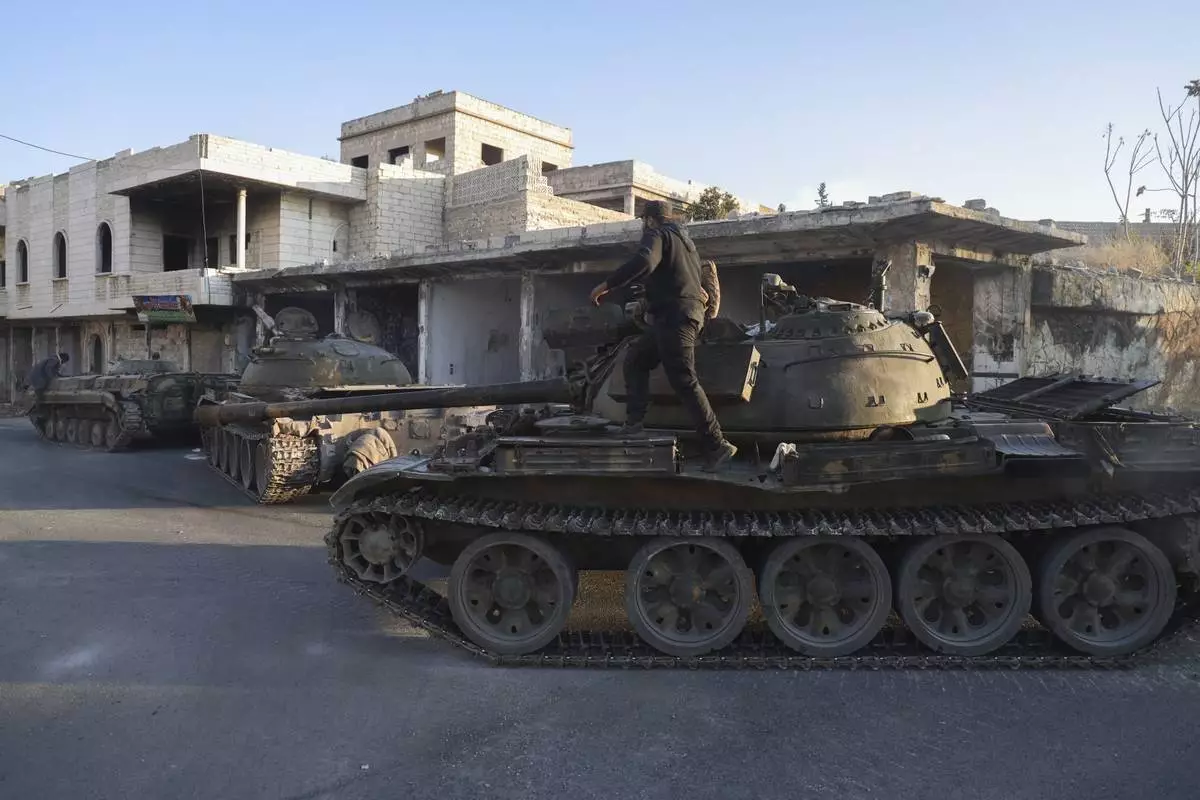
Syrian opposition fighters manoeuvre using armoured vehicles seized from the Syrian army in the town of Maarat al-Numan, south of Idlib, Syria, Tuesday Dec. 3, 2024.(AP Photo/Omar Albam)
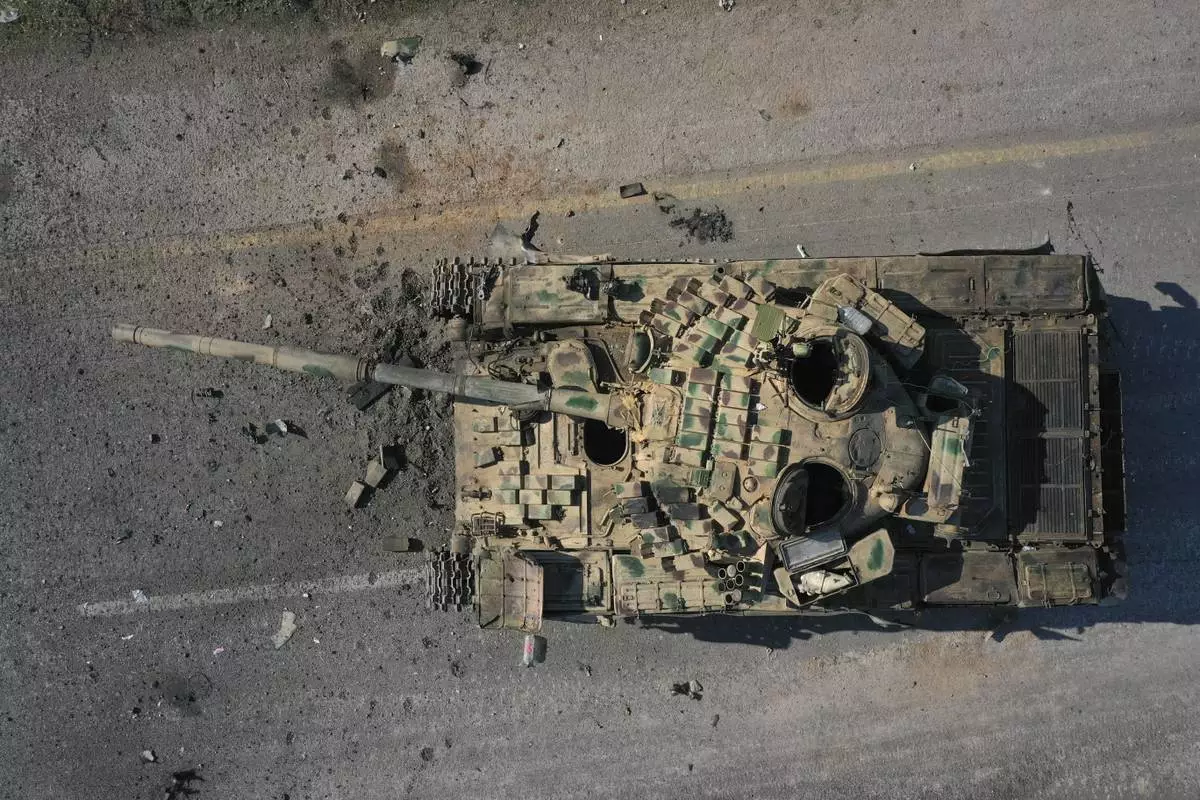
An abandoned Syrian army armoured vehicle sits on a road controlled by Syrian insurgents in the outskirts of Hama, Syria, Tuesday Dec. 3, 2024.(AP Photo/Ghaith Alsayed)
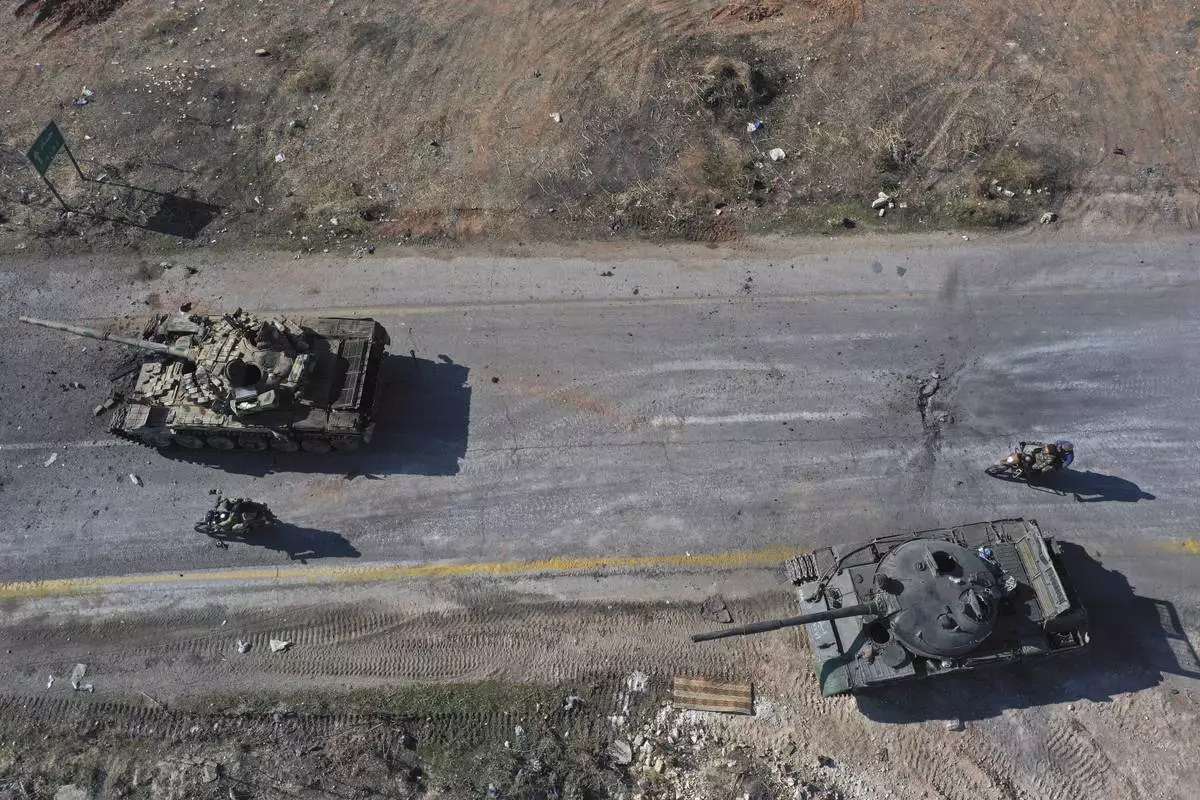
Syrian insurgents ride on motorcycles through abandoned Syrian army vehicles on a road in the outskirts of Hama, Syria, Tuesday Dec. 3, 2024.(AP Photo/Ghaith Alsayed)








